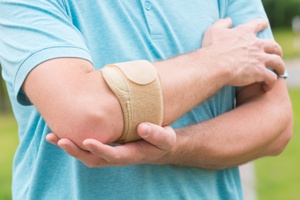 Tiny fluid-filled sacs cushion our bones, tendons, and muscles. When these sacs, called bursa, become, inflamed bursitis may be diagnosed. Bursitis is a painful condition that may occur in different parts of the body, but most commonly happens in the shoulder, elbow, hip, or knee. If you experience joint pain, swelling, bruising, or even a fever after a car crash, it is important to see your doctor for a prompt diagnosis. Contact a Louisville car accident attorney for legal help and to set up a free case consultation.
Tiny fluid-filled sacs cushion our bones, tendons, and muscles. When these sacs, called bursa, become, inflamed bursitis may be diagnosed. Bursitis is a painful condition that may occur in different parts of the body, but most commonly happens in the shoulder, elbow, hip, or knee. If you experience joint pain, swelling, bruising, or even a fever after a car crash, it is important to see your doctor for a prompt diagnosis. Contact a Louisville car accident attorney for legal help and to set up a free case consultation.
How Bursitis Develops From a Car Crash
Bursitis can occur from a trauma, such as a car accident. If your knee, shoulder, hip, or another part of your body is impacted during the wreck, the bursa in that joint may become inflamed.
Unlike other car accident injuries, such as broken bones, bursitis can be tricky to diagnose and to connect back to a crash injury. The symptoms of bursitis may not appear immediately after an accident. Instead, you may begin to notice stiffness, pain, or swelling in the hours or days following the accident.
As soon as you begin to experience symptoms, it is important to see a doctor. Your doctor can diagnose your injury and, if appropriate, determine why the injury occurred. Even if you see a doctor days after your crash, your doctor may be able to test for bursitis by:
- Ordering x-rays to rule out other types of injuries that may be causing you pain.
- Ordering blood tests or a test to analyze the fluid in the bursa to determine if the bursa is inflamed and if that inflammation is causing your pain.
Once bursitis is diagnosed, your doctor may be able to rule out other causes for the condition. For example, bursitis is often caused by repetitive motion or other health conditions like arthritis or diabetes. If you were recently in a car accident and if you did not have bursitis prior to your crash, then it is unlikely that repetitive motion or another disease suddenly caused your bursitis immediately after your crash. Instead, the more likely cause of your condition may be the car accident trauma.
Bursitis Treatment
Initial treatment for bursitis usually includes rest, ice, and pain medication. You may be out of work and unable to complete your daily activities during this time.
If rest, ice, and pain medication don’t make you feel better, then there are a variety of other medical treatments that may be available, including:
Physical therapy.
Sometimes strengthening the muscle around the inflamed bursa can alleviate bursitis pain.
Corticosteroid injections.
The injection of corticosteroid medication can help you with your pain and inflammation. Some people need just one injection to feel better, and other patients need more than one injection.
Surgery.
When other treatments fail, your doctor may suggest surgery. Surgery may be required to drain the bursa or in extreme cases to remove the bursa.
Assistive medical devices.
If, for example, you experience bursitis in the knee, crutches or a cane could help alleviate the pressure on your knee and help you heal.
These treatments may be inconvenient, and you may be worried about how to pay for them.
Protect Your Legal Recovery After a Bursitis Injury
If another driver’s negligence caused your bursitis, you have the right to pursue a car accident claim. Through negotiations with the insurance company or court proceedings, you may be able to recover damages for your past and future:
- Medical expenses
- Lost income
- Out-of-pocket costs
- Physical pain and emotional suffering
Soft tissue injuries, such as bursitis, can result in significant damages, but those damages may be more difficult to prove than other types of injuries.
Have You Been Injured In A Kentucky Car Accident?
If you’ve been injured in a car accident you need to speak with an experienced car accident attorney as soon as possible. Please contact us online or call our Louisville office directly at 888.450.4456 to schedule a free consultation.
Related Links: